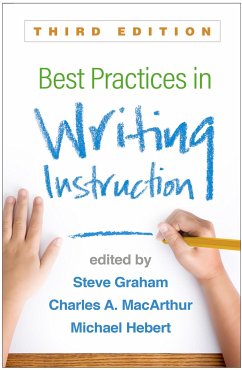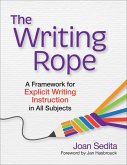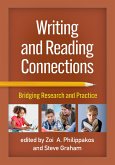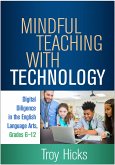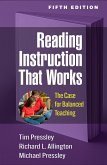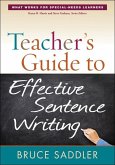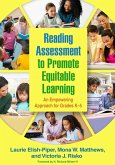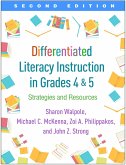Best Practices in Writing Instruction
Herausgeber: Graham, Steve; Hebert, Michael A; MacArthur, Charles A
Best Practices in Writing Instruction
Herausgeber: Graham, Steve; Hebert, Michael A; MacArthur, Charles A
- Broschiertes Buch
- Merkliste
- Auf die Merkliste
- Bewerten Bewerten
- Teilen
- Produkt teilen
- Produkterinnerung
- Produkterinnerung
Well established as a definitive text--and now revised and updated with eight new chapters--this book translates cutting-edge research into effective guidelines for teaching writing in grades K-12. Illustrated with vivid classroom examples, the book identifies the components of a complete, high-quality writing program. Leading experts provide strategies for teaching narrative and argumentative writing; using digital tools; helping students improve specific skills, from handwriting and spelling to sentence construction; teaching evaluation and revision; connecting reading and writing…mehr
Andere Kunden interessierten sich auch für
![The Writing Rope The Writing Rope]() Joan SeditaThe Writing Rope39,99 €
Joan SeditaThe Writing Rope39,99 €![Writing and Reading Connections Writing and Reading Connections]() Zoi A. PhilippakosWriting and Reading Connections41,99 €
Zoi A. PhilippakosWriting and Reading Connections41,99 €![Mindful Teaching with Technology Mindful Teaching with Technology]() Troy Hicks (United States" "Central Michigan University)Mindful Teaching with Technology37,99 €
Troy Hicks (United States" "Central Michigan University)Mindful Teaching with Technology37,99 €![Reading Instruction That Works Reading Instruction That Works]() Tim PressleyReading Instruction That Works69,99 €
Tim PressleyReading Instruction That Works69,99 €![Teacher's Guide to Effective Sentence Writing Teacher's Guide to Effective Sentence Writing]() Bruce Saddler (United States University at Albany)Teacher's Guide to Effective Sentence Writing37,99 €
Bruce Saddler (United States University at Albany)Teacher's Guide to Effective Sentence Writing37,99 €![Reading Assessment to Promote Equitable Learning Reading Assessment to Promote Equitable Learning]() Laurie Elish-PiperReading Assessment to Promote Equitable Learning52,99 €
Laurie Elish-PiperReading Assessment to Promote Equitable Learning52,99 €![Differentiated Literacy Instruction in Grades 4 and 5 Differentiated Literacy Instruction in Grades 4 and 5]() Sharon Walpole (United States University of Delaware)Differentiated Literacy Instruction in Grades 4 and 551,99 €
Sharon Walpole (United States University of Delaware)Differentiated Literacy Instruction in Grades 4 and 551,99 €-
-
-
Well established as a definitive text--and now revised and updated with eight new chapters--this book translates cutting-edge research into effective guidelines for teaching writing in grades K-12. Illustrated with vivid classroom examples, the book identifies the components of a complete, high-quality writing program. Leading experts provide strategies for teaching narrative and argumentative writing; using digital tools; helping students improve specific skills, from handwriting and spelling to sentence construction; teaching evaluation and revision; connecting reading and writing instruction; teaching vulnerable populations; using assessment to inform instruction; and more.
Hinweis: Dieser Artikel kann nur an eine deutsche Lieferadresse ausgeliefert werden.
Hinweis: Dieser Artikel kann nur an eine deutsche Lieferadresse ausgeliefert werden.
Produktdetails
- Produktdetails
- Verlag: Guilford Publications
- 3 ed
- Seitenzahl: 416
- Erscheinungstermin: 27. Dezember 2018
- Englisch
- Abmessung: 226mm x 152mm x 25mm
- Gewicht: 568g
- ISBN-13: 9781462537969
- ISBN-10: 1462537960
- Artikelnr.: 52529886
- Herstellerkennzeichnung
- Libri GmbH
- Europaallee 1
- 36244 Bad Hersfeld
- gpsr@libri.de
- Verlag: Guilford Publications
- 3 ed
- Seitenzahl: 416
- Erscheinungstermin: 27. Dezember 2018
- Englisch
- Abmessung: 226mm x 152mm x 25mm
- Gewicht: 568g
- ISBN-13: 9781462537969
- ISBN-10: 1462537960
- Artikelnr.: 52529886
- Herstellerkennzeichnung
- Libri GmbH
- Europaallee 1
- 36244 Bad Hersfeld
- gpsr@libri.de
Steve Graham, EdD, is the Warner Professor in the Division of Educational Leadership and Innovation at Mary Lou Fulton Teachers College, Arizona State University. He is also Research Professor in the Learning Science Institute at the Australian Catholic University in Brisbane. Dr. Graham is editor of the Journal of Educational Psychology. He has coedited several books, including Handbook of Writing Research, Second Edition; Handbook of Learning Disabilities, Second Edition; and Best Practices in Writing Instruction, Third Edition. He is the coauthor of three influential Carnegie Corporation reports: Writing Next, Writing to Read, and Informing Writing. Dr. Graham has received numerous awards, including the Sylvia Scribner Award from Division C of the American Educational Research Association (AERA), the Career Research Award from the Council for Exceptional Children (CEC), the Kauffman-Hallahan Distinguished Researcher Award from the CEC Division of Research, the Samuel A. Kirk Award from the CEC Division of Learning Disabilities, the Distinguished Researcher Award from the special education interest group of the AERA, and the Wiederholt Distinguished Lecturer Award from the Council of Learning Disabilities. He was elected to the Reading Hall of Fame in 2018 and is a fellow of AERA, Division 15 of the American Psychological Association, and the International Academy for Research in Learning Disabilities. Charles A. MacArthur, PhD, is Professor Emeritus of Special Education and Literacy in the School of Education at the University of Delaware. A former special education teacher, Dr. MacArthur has been conducting research on writing development and instruction for struggling writers since the 1980s. Most recently, he was principal investigator on two grants to develop and examine the efficacy of a writing curriculum for college basic writing courses. Other research projects have focused on the development of a writing curriculum for students with learning disabilities, writing strategy instruction, decoding instruction in adult education, speech recognition as a writing accommodation, project-based learning in social studies in inclusive classrooms, and first-grade writing instruction. Dr. MacArthur is a Fellow of the American Educational Research Association and a recipient of a research award from the Council for Exceptional Children. He has served as coeditor of the Journal of Writing Research and the Journal of Special Education, has published over 125 articles and book chapters, and is coeditor or coauthor of several books. Michael Hebert, PhD, is Associate Professor in the Department of Special Education and Communication Disorders at the University of Nebraska-Lincoln. His primary research interests include the development and testing of writing interventions for students with disabilities, examining the impacts of writing on reading outcomes, and writing assessment. He is the coauthor of two influential Carnegie Corporation reports: Writing to Read and Informing Writing. Dr. Hebert is currently the principal investigator of an Early Career Development and Mentoring grant from the National Center for Special Education Research, with his project focused on developing an informational text writing intervention for fourth-grade struggling writers. He was previously a fellow in the Experimental Education Research Training program supported by the Institute of Education Sciences. Dr. Hebert serves on the editorial board of the Journal of Educational Psychology.
I. Introduction 1. Evidence-Based Practices in Writing
Steve Graham & Karen R. Harris II. Creating a Supportive Writing Environment 2. Setting Up the Writing Classroom
Linda Friedrich 3. Motivating Writers
Pietro Boscolo & Carmen Gelati III. Writing for Different Purposes 4. Narrative Writing
Carol Booth Olson & Lauren Godfrey 5. Writing from Source Material
Michael Hebert 6. Argumentative Writing
Ralph P. Ferretti & William E. Lewis 7. Writing to Learn
Perry D. Klein
Katrina N. Haug
& Ashley Bildfell 8. Writing with Digital Tools
Rachel Karchmer-Klein IV. Teaching Writing 9. Handwriting and Spelling
Rui Alexandre Alves
Teresa Limpo
Naymé Salas
& R. Malatesha Joshi 10. Sentence Construction
Bruce Saddler 11. Planning
Debra McKeown & Erin FitzPatrick 12. Evaluation and Revision
Charles A. MacArthur 13. Reading-Writing Connections
Timothy Shanahan 14. Assessing Writing
Joshua Wilson 15. Instruction for Students with Special Needs
Amy Gillespie Rouse 16. Instruction for English Learners
Adrian Pasquarella Index
Steve Graham & Karen R. Harris II. Creating a Supportive Writing Environment 2. Setting Up the Writing Classroom
Linda Friedrich 3. Motivating Writers
Pietro Boscolo & Carmen Gelati III. Writing for Different Purposes 4. Narrative Writing
Carol Booth Olson & Lauren Godfrey 5. Writing from Source Material
Michael Hebert 6. Argumentative Writing
Ralph P. Ferretti & William E. Lewis 7. Writing to Learn
Perry D. Klein
Katrina N. Haug
& Ashley Bildfell 8. Writing with Digital Tools
Rachel Karchmer-Klein IV. Teaching Writing 9. Handwriting and Spelling
Rui Alexandre Alves
Teresa Limpo
Naymé Salas
& R. Malatesha Joshi 10. Sentence Construction
Bruce Saddler 11. Planning
Debra McKeown & Erin FitzPatrick 12. Evaluation and Revision
Charles A. MacArthur 13. Reading-Writing Connections
Timothy Shanahan 14. Assessing Writing
Joshua Wilson 15. Instruction for Students with Special Needs
Amy Gillespie Rouse 16. Instruction for English Learners
Adrian Pasquarella Index
I. Introduction 1. Evidence-Based Practices in Writing
Steve Graham & Karen R. Harris II. Creating a Supportive Writing Environment 2. Setting Up the Writing Classroom
Linda Friedrich 3. Motivating Writers
Pietro Boscolo & Carmen Gelati III. Writing for Different Purposes 4. Narrative Writing
Carol Booth Olson & Lauren Godfrey 5. Writing from Source Material
Michael Hebert 6. Argumentative Writing
Ralph P. Ferretti & William E. Lewis 7. Writing to Learn
Perry D. Klein
Katrina N. Haug
& Ashley Bildfell 8. Writing with Digital Tools
Rachel Karchmer-Klein IV. Teaching Writing 9. Handwriting and Spelling
Rui Alexandre Alves
Teresa Limpo
Naymé Salas
& R. Malatesha Joshi 10. Sentence Construction
Bruce Saddler 11. Planning
Debra McKeown & Erin FitzPatrick 12. Evaluation and Revision
Charles A. MacArthur 13. Reading-Writing Connections
Timothy Shanahan 14. Assessing Writing
Joshua Wilson 15. Instruction for Students with Special Needs
Amy Gillespie Rouse 16. Instruction for English Learners
Adrian Pasquarella Index
Steve Graham & Karen R. Harris II. Creating a Supportive Writing Environment 2. Setting Up the Writing Classroom
Linda Friedrich 3. Motivating Writers
Pietro Boscolo & Carmen Gelati III. Writing for Different Purposes 4. Narrative Writing
Carol Booth Olson & Lauren Godfrey 5. Writing from Source Material
Michael Hebert 6. Argumentative Writing
Ralph P. Ferretti & William E. Lewis 7. Writing to Learn
Perry D. Klein
Katrina N. Haug
& Ashley Bildfell 8. Writing with Digital Tools
Rachel Karchmer-Klein IV. Teaching Writing 9. Handwriting and Spelling
Rui Alexandre Alves
Teresa Limpo
Naymé Salas
& R. Malatesha Joshi 10. Sentence Construction
Bruce Saddler 11. Planning
Debra McKeown & Erin FitzPatrick 12. Evaluation and Revision
Charles A. MacArthur 13. Reading-Writing Connections
Timothy Shanahan 14. Assessing Writing
Joshua Wilson 15. Instruction for Students with Special Needs
Amy Gillespie Rouse 16. Instruction for English Learners
Adrian Pasquarella Index

